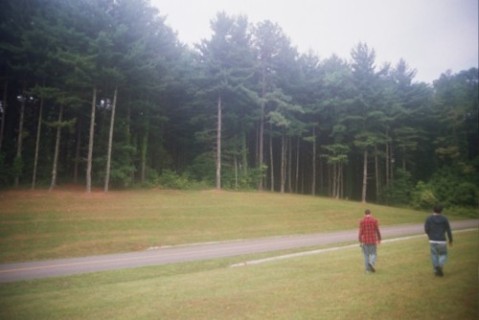On Bear in Heaven, Sunset Airway, Lower Dens
November 5, 2010 § 2 Comments
I would feel a little foolish dropping a link in this blog for everything I write somewhere else. But it makes sense to say that I’ve been spending a lot of time writing live show reviews for OPB Music. Barring any major lifestyle changes I’ll be posting on their site more and more often over the next few months.
This Bear in Heaven/Sunset Airway/Lower Dens piece is my most recent review.
Scott’s Songs
October 28, 2010 § 1 Comment
I produced a television feature for Oregon Public Broadcasting. It’s advertised as a story about a Portland, Ore. band called Super XX Man. But it’s really about this guy, Scott Garred.
I was drawn to this story for its simplicity. Scott is prolific. He has just released his 13th album as Super XX Man. Anyone who has written over a hundred songs with moderate success has something to say. And his tale came embedded with a second angle. Scott works as a music therapist at Oregon State Hospital – the hospital featured in One Flew Over the Cuckoo’s Nest.
I got to know Scott well over the course of the project. I think ‘modest’ is the first word most people would use to describe him. He never talks in grand terms about his songwriting or his future plans. And Scott’s music as Super XX Man won’t put anyone out of their comfort zone. The songs pretty much follow straightforward rock and pop forms. On the surface, it’s all too uncomplicated.
I think Scott’s greatest talent as a songwriter is his ability to write a good song about anything. Scott is no Dylan, he’s no poet or philosopher. But by writing consistently and constantly over the past 15 years, his discography is effectively a vivid self-portrait. It’s not really a case of art imitating life. Rather it’s a life subsumed by art. Throughout the project I became more and more aware of this symbiotic relationship between Scott’s life and his music. This is the story I wanted to tell in the feature.
It was a challenge in the end to translate what I thought was interesting about Scott into a short documentary. A story about genius or anomaly will always be more compelling than one about a normal guy. But maybe you’ll see what I mean?
You can watch it here.
If It Be Your Will
October 11, 2010 § Leave a comment
Norwegian radio producer Kari Hesthamar interviewed Leonard Cohen in 2005. Their discussion is centered around Cohen’s affair with a woman named Marianne. She’s enshrined in a famous song he wrote for his debut album, Songs of Leonard Cohen. They met in Hydra and their relationship lasted through the 1960’s.
In focusing on this particular relationship, the interview is a window into Cohen’s ideas about memory. Many of his thoughts are shaped from his experiences with Zen Buddhism. But there’s also something tangential to Buddhism, something more inherent to Cohen, something I might misinterpret as ambivalence, that seeps from his answers. When asked what he remembers from his time with Marianne, he responds:
“You remember when your children were born, or you remember when maybe the first time you saw Hydra, or maybe the first time you went on the stage with your guitar. A few things like that, but I don’t remember the life that I was leading, before I met Marianne, or after really, it seems to be all the same.”
The interview is produced as an audio story. Hesthamar intersperses ambient noise from his apartment as well as short interactions Cohen has with various friends throughout the interview. The production commands a similar presence to cinéma vérité. In listening to the piece, there is a strong feeling of provocation towards Cohen. She is almost pushing him to tell a particular version of the past. But the interview methodology is balanced by Cohen’s thoughtful words and the rich sonic texture created with music and ambient noise. It’s an unusual radio piece. It does a beautiful job of creating a space that is uniquely Cohen’s. It’s easy to fall prey to his words even if you’re not quite sure about them.
You can read a transcript of the interview here.






